By the way, it should be noted that, at the time, the knowledge of mental problems was not as advanced as it is today. Frances Farmer was a troubled woman and suffered from neurotic tendencies. She was also plagued with drinking problems since the end of the 1930s. Her decreasing mental stability at the beginning of the 1940s led to her internment in a psychiatric hospital. Would Frances Farmer have known the same fate today? Probably not. The expertise on psychological and psychiatric problems and illnesses has considerably progressed since the 1940s. New treatments have emerged, new psychotropics have been produced and research continuously advances. Furthermore, the medical staff is now much more respectful of their patients. Nowadays, Frances Farmer would certainly have not been termed as insane and the drastic decision to put her in an asylum would not have been taken. Just remember that, a few years before Frances was institutionalised, the sister of a future President of the United States, Rosemary Kennedy, had been lobotomised just because of her intellectual disabilities and her sudden mood changes… Those were different times!
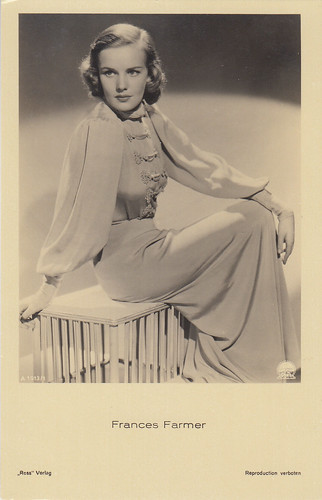
German postcard by Ross Verlag, no. A1513/1, 1937-1938. Photo: Paramount.
A young girl who made headlines
Frances Farmer was born on the 19th of September 1913. When she was four years old, her mother, a strong-willed and unconventional woman, left her husband. They finally divorced in 1929.
In April 1931, she won a national essay contest with her entry entitled 'God Dies'. Her controversial views about the absence of a God made headlines.
She then entered the University of Washington, where her interest in stage acting deepened. She soon joined the University’s Drama Department and notably had great success in 1934 in the play 'Alien Corn'.
In 1935, she won a trip to Russia following a contest run by a leftist newspaper, 'The Voice of Action'. Her appalled mother publicly voiced her disapproval and unsuccessfully tried to prevent her departure. The press again had a field day.
Later, in New York, she met agent Shepard Traube, who got her an interview with Oscar Serlin, the New York talent chief for Paramount Pictures. She was screen-tested in August and signed a seven-year contract with Paramount in September.
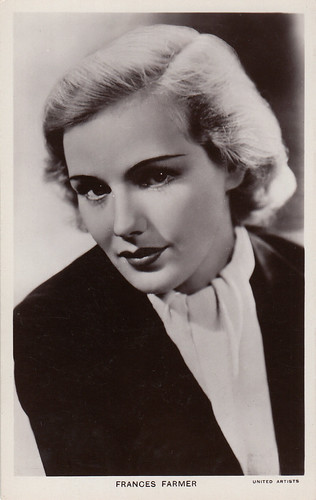
British postcard by Picturegoer, no. 1105. Photo: United Artists.
A rising movie star
Her film debut was as the female lead in Too Many Parents (1936), which was followed by Border Flight (1936). Her career received a big boost when she was chosen to be Bing Crosby’s leading lady in Rhythm on the Range (1936).
She got her big break when she was loaned to Samuel Goldwyn for the box office hit Come and Get It (1936), directed by Howard Hawks and William Wyler.
Frances Farmer was now a rising star and received rave reviews.
She was back at Paramount for Exclusive (1937), opposite Fred MacMurray, and Ebb Tide (1937), opposite Ray Milland. She was also borrowed by R.K.O. to star in The Toast of New York (1937), opposite Cary Grant.
At the same time, she began to acquire the reputation of being a troublemaker, a rebel and a nonconformist who was unwilling to yield to Hollywood rules. Furthermore, she supported left-wing political causes. For example, she embraced the cause of the Loyalists in the Spanish Civil War and was sympathetic to the plight of migrant farm workers in the San Joaquin Valley. This was not exactly what Paramount expected of her.
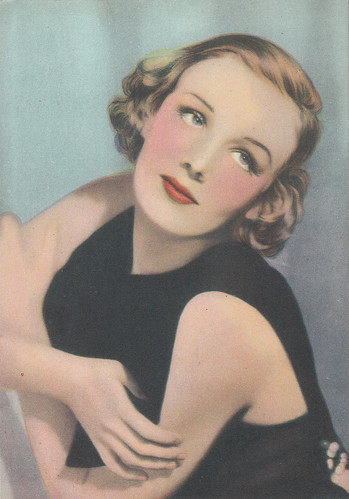
Italian postcard by NMM.
Frances on stage
In mid-1937, she went to work in the summer stock theatre and was happy to be away from the pressure of the movie industry.
She was then offered to join the Group Theater and was afforded the female lead in Clifford Odets’ play 'Golden Boy'. It was a success and it ran on Broadway from November 1937 to June 1938. She also embarked on a love affair with Odets, who will later abruptly end their relationship, which deeply hurt her.
After her Broadway play, she went back to Paramount for Ride a Crooked Mile (1938), opposite Leif Erickson, her husband from 1936 to 1942. After that, she went on tour with 'Golden Boy'.
She spent the year 1939 on stage. She was directed by Elia Kazan in an experimental play called 'Quiet City', which had a very short run on Broadway in April. She then worked in summer stock before being back on Broadway for Robert Ardrey’s 'Thunder Rock', again directed by Kazan. It was a flop: it opened on the 14th of November and closed on the 2nd of December.
She then began rehearsals for Ernest Hemingway’s 'The Fifth Column' but, physically and emotionally exhausted, withdrew from the project and was fined $1500 for her walkout.
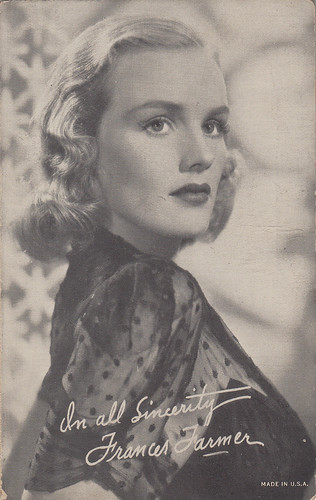
American Arcade card.
Back to Hollywood
A disheartened Frances Farmer went back to Hollywood but Paramount had somewhat lost interest in her.
They loaned her to United Artists for South of Pago Pago (1940), to Warner for Flowing Gold (1940) and to Universal for Badlands of Dakota (1941).
During the filming of Badlands of Dakota (1941), she unsuccessfully fought to de-glamourize her character of Calamity Jane, which only reinforced her image as a difficult actress.
At Paramount, she was put in World Premiere (1941), a late John Barrymore vehicle, and in Among the Living (1941), in which newcomer Susan Hayward had the showier role.
After she had played the scheming and treacherous Isabel in Son of Fury (1942) at 20th Century Fox, film offers dried up. All hell soon broke loose.
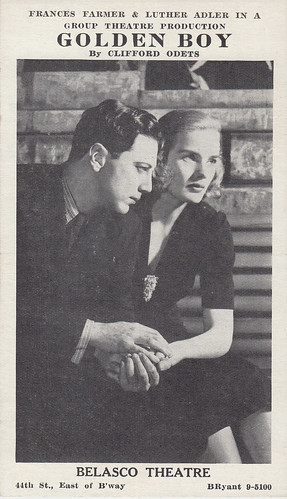
American promotional postcard by Allied Printing, New York. Frances Farmer and Luther Adler in the stage production 'Golden Boy' (1937-1938) by Group Theatre.
A downward spiral
On the 19th of October 1942, after having had a few drinks, she was arrested for driving in a dim-out zone with her traffic lights on high beam. At the police station, she was pronounced intoxicated. She was sentenced to 180 days in jail but was put on a two-year probation. Paramount unceremoniously cancelled her contract. At the end of 1942, she went to Mexico City to start the filming of an independent picture but problems arose. Mexican authorities soon charged her for drunk and disorderly conduct and asked her to leave the country.
She then accepted an offer from Poverty Row company Monogram to star in the programmer No Escape. She began working briefly on it in January 1943 but, after she had violently attacked the studio hairdresser, she was replaced by Mary Brian.
On the 14th of January, as she had not respected the terms of her probation, she was arrested in her hotel. Her hearing the next morning didn’t go on peacefully and she had to be carried out of the courtroom by policemen. Shocking and unflattering press photographs were taken. On the 20th of January, a court order declared her mentally incompetent and she was soon sent to a private sanatorium. Alarmed by the effects of the insulin shots she was given, she walked out after a few months. For some time, she stayed with her mother, who was to be appointed her legal guardian. In March 1944, a commitment proceeding took place. Psychiatrists had determined that she was suffering from schizophrenia and she was ordered to the Western Washington State Hospital for the Insane.
She was paroled in July 1944 but her mental state didn’t really improve. Her erratic behaviour caused concern. She was becoming more restless and rebellious. Her mother, who was about 70 years old at the time, considered that she could not handle her daughter anymore and, in May 1945, Frances was recommitted to the Western State Hospital. Except for a brief two-month parole in early 1946, she was going to spend several years there. Contrary to what William Arnold implies in his book 'Shadowland' in 1978, Frances Farmer has never been lobotomised by Dr. Walter Freeman during her stay in the asylum. The Western State Hospital archives show that they meticulously recorded all the lobotomies which were performed and Frances Farmer’s name is nowhere to be found. The same can be said of Dr. Freeman’s personal archives which had no mention of Frances Farmer’s name.
On the other hand, medical records show that she received at least one series of electroshocks for about three months in 1945. When she was interviewed in the TV show This Is Your Life in 1957, Frances also spoke of harsh hydrotherapy treatments which, at the time, consisted of forced ice-cold water baths. There had been other claims of mistreatment in 'Will There Really Be a Morning?' and 'Shadowland' but they have to be taken into caution as both books are reputed to be partly fictionalised. Nonetheless, the living conditions at Western State Hospital had been especially painful and her years of hospitalisation undoubtedly left her emotionally scarred.
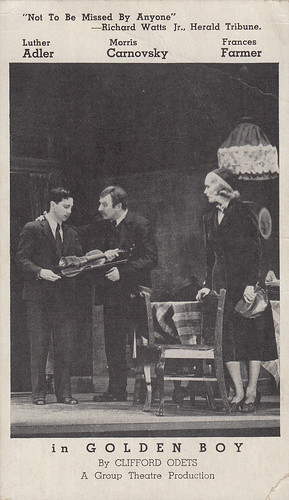
American promotional postcard by Allied Printing, New York. Frances Farmer, Luther Adler and Morris Carnovsky in the stage production 'Golden Boy' (1937-1938) by Group Theatre.
Release
Frances Farmer was released in March 1950.
At the beginning of the 1950s, she regained her competency and her civil rights and her mother was discharged as her guardian.
In April 1954, Frances married Arthur Lobley but their union didn’t last long.
She soon departed alone for Eureka, a small town in California, where she worked for a few years as an office assistant and secretary.
Her mother died in 1955 and her father passed away in 1956.
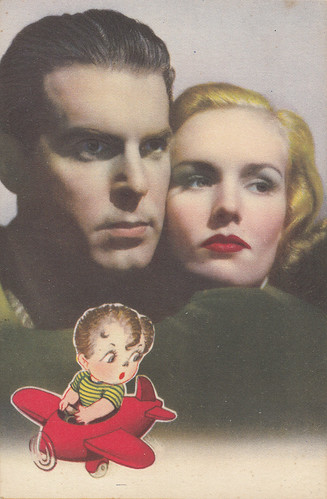
Portuguese postcard by Postais Krohn, Porto. Frances Farmer and Fred MacMurray in Exclusive (Alexander Hall, 1937).
Her comeback
In 1957, a radio advertising man, Lee Mikesell, encouraged her to make a comeback and persuaded her to go to San Francisco. After a successful press conference, she was back in the public eye. On the 30th of June 1957, she appeared on TV on the popular Ed Sullivan Show and sang 'Aura Lee', a tune she had sung some twenty years before in Come and Get It and which had been revived by Elvis Presley the previous year as 'Love Me Tender'. Audiences reacted positively. In August 1957, she came back to the stage in Enid Bagnold’s 'The Chalk Garden' in New Hope.
On the 27th of October, she was again on the Ed Sullivan Show and, on the 29th of January 1958, she was the principal guest of the famous TV show This Is Your Life. She acted in several live television dramas such as Reunion in January 1958 or Tongues of Angels in March 1958. She also made an ultimate return to the big screen in the teenage drama The Party Crashers (1958), as Bobby Driscoll’s mother.
She then did summer stock before accepting an offer to host her own TV show, Frances Farmer Presents, in Indianapolis. It was a rating winner. It began on the 13th of October 1958 and ran until 1964. Over the years, she would interview, among others, Ginger Rogers, Barbra Streisand, Sophie Tucker, Sylvia Sidney and Helen Hayes.
On a personal note, after her divorce from Lobley had finally been granted, she married Lee Mikesell in March 1958 but they soon separated and officially divorced in 1963. Frances Farmer made her last appearance on stage in 1965 in a short run of Frederick Dürrenmatt’s 'The Visit', at Purdue University in West Lafayette. Her arrest following a drunk-driving car crash, which occurred at the same time, didn’t affect the success of the play, on the contrary.
After that, she retired from show business. She nonetheless gave a series of poetry readings in May 1968 at the Indianapolis Art Museum. That same year, she formally converted to Catholicism. She also gave up alcohol. Frances Farmer died on the 1st of August 1970 from oesophageal cancer.
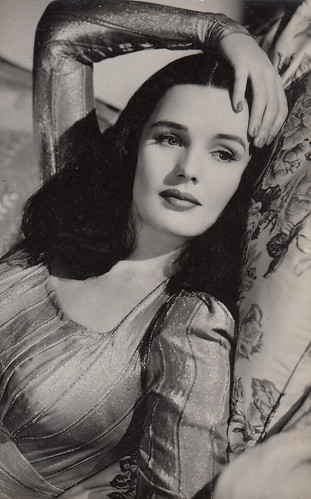
Spanish postcard by Archivo Bermejo, no. 950. Frances Farmer in World Premiere (Ted Tetzlaff, Otis Garrett, 1941).
Aftermath
At the end of the 1960s, Frances Farmer took an interest in writing her memoirs and started collaborating with writer Lois Kibbee. But after Farmer died in 1970, Kibbee dropped out of the project. An autobiography, 'Will There Really Be a Morning?' was posthumously published in 1972 but is commonly thought to have been embroidered, dramatised and mostly ghostwritten by Jean Ratcliffe, who had been a close friend of Frances during the last years of her life.
In 1978, a so-called biography, 'Shadowland', written by William Arnold, was published. It was in this book that Arnold wrongly implied that lobotomy had been performed on Frances Farmer. It was the first time that such an allegation was made. Other mistakes were to be found in Arnold’s book. Although it has been released as nonfiction, the reality was different. In the 1980s, following a lawsuit for copyright infringement filed by Arnold against the producers of the movie Frances, the Judge concluded that "The evidence introduced at trial established that portions of the book were fabricated by Arnold".
In 1978, 'Look Back in Love', written by Frances’ sister Edith, was released. But it was a self-published book and not many copies were printed. In 1979, Patrick Agan devoted a chapter to Frances in his book 'The Decline and Fall of the Love Goddesses'. He had been given at the time access by Lois Kibbee to correspondence between her and Frances and previously unpublished manuscript notes.
Later, journalist, writer and musician Jeffrey Kaufmann took a deep interest in Frances Farmer and did extensive research on her. Thanks to medical archival records, he was notably able to debunk Arnold’s claim of lobotomy. He also tried to put the record straight about other mistakes and misrepresentations about the actress. Kaufmann corresponded and had phone conversations with Frances’ sister Edith who, needless to say, had deep contempt for both 'Will There Really Be a Morning?' and 'Shadowland'. She notably defended her parents, claiming that they had been confronted with a situation beyond their control. He also was in touch with Frances’ nephew, David. Other Kaufmann sources include the aforementioned Patrick Agan, who provided him tapes of Lois Kibbee, and Jack El-Hai, who was the biographer of Dr. Walter Freeman, the man who, according to Arnold, would have lobotomised Frances. El-Hai confirmed that no mention of Frances’ alleged lobotomy was ever found in Freeman’s archives and that there was no public record of the doctor ever mentioning Frances Farmer in any way whatsoever. For the record, Freeman was one of the two doctors who had performed a lobotomy in 1941 on Rosemary Kennedy, future President John Fitzgerald Kennedy’s sister.
In 2011, Peter Shelley’s book 'Frances Farmer: The Life and Films of a Troubled Star' was published. The author rightly writes: "Frances Farmer’s story is clouded in myth and conjecture, scandal and gossip. What is true and what is fiction in relation to Frances’ private life is anyone’s guess."
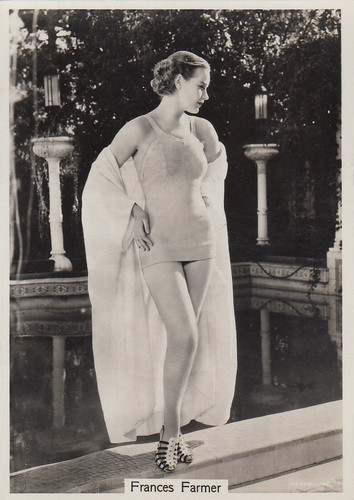
Cigarette card by Godfrey Phillips Ltd. and Associated Companies in the Beauties of To-Day series, no. 35.
Films and songs
The publication of several books on Frances Farmer in the 1970s renewed interest in her story.
In 1982, the biopic Frances was released. It starred Jessica Lange as Frances. Although the movie was advertised as "based on the true life story of Frances Farmer", it came out as a mix of facts and fiction. Jessica Lange was rightly nominated for the Best Actress Academy Award but lost to Meryl Streep for Sophie’s Choice.
In 1983 came the TV movie Will There Really Be a Morning? with Susan Blakely as Frances. Just as it had been the case for Frances, it was also hampered by inaccuracies. In 1984, a more obscure and experimental film, Committed, was produced. It was directed by Sheila McLaughlin, who also played Frances, and Lynne Tillman.
France’s Farmer’s story inspired the music world as well and here are a few examples. French pop idol Mylène Farmer took her pseudonym from Frances Farmer and dedicated her first single, 'Maman a tort', to her in 1984. That same year, Frances was the subject of Culture Club’s song 'The Medal Song' and, in 1985, Everything But the Girl’s 'Ugly Little Dreams' was about her.
In 1993, a song called 'Frances Farmer Will Have Her Revenge on Seattle' was included on Nirvana’s album 'In Utero'. Kurt Cobain had been fascinated by Frances and had found parallels between them. In 1992, Courtney Love had married Cobain in a silk and lace dress that had allegedly been once worn by Frances.
Text and postcards: Marlene Pilaete.
No comments:
Post a Comment